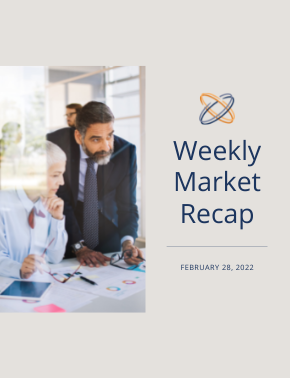Week in Review
Equity Markets:
Early on Thursday, February 24, news broke that Russia had invaded Ukraine. In just the first few days, this tragedy has sent shockwaves across the world. It is possible this could lead to the most severe conflict on European soil in decades.
Volatility spiked in the futures market as the news broke. The equity markets spent most of the day severely in the red but a late rally pushed the markets positive. The equity market followed up with a strong finish on Friday to end the week positive. Oil spiked to over $100 a barrel Thursday, on concerns of potential sanctions against Russian oil exports.
The shortened trading week saw the S&P close in correction territory for the first time since the pandemic on Tuesday. Valuations have come down dramatically, and after the close on Wednesday, the S&P was trading at a forward price-to-earnings of ~18.5 based on consensus 2022 earnings expectations. This is in line with the 5-yr average.
There have been 18 market corrections that have not led to a recession since 1971, according to Morningstar. On average, these corrections have been -14.5%. Market environments like today may be uncomfortable, but it is important to remember they are not unprecedented. The S&P has been up an average of ~17% in the six months following these corrections, according to Morningstar.
Fixed Income Markets:
The 10-yr Treasury Bond saw heavy buying pressure as investors ran for safe haven assets on Thursday after the invasion of Ukraine. The 10-yr dropped below 1.9% intraday, but ended the week at 1.97%. The yield curve has steadily been flattening over the past year. The closely watched 2’s/10’s spread currently stands at 0.42%, down from the post-pandemic high of 1.57% last March. The spread between the 2-yr Treasury and 10-yr Treasury has been a good indicator for recession risk. If this spread were to turn negative, it has been a reliable indicator of a heightened risk for recession historically.
Economic:
The Core Personal Consumption Expenditures Index was in line with expectations and rose by 5.2%, the highest since 1982. This index is closely watched by the Fed, and has a significant impact on policy. There were positive surprises in personal spending and income. The consumer appears to remain strong which is very positive news for economic growth.
Looking Ahead
Equity Markets:
The markets will be closely watching the developments between Russia and Ukraine. There have been talks of a meeting between leaders of both countries. This is an example of why it is so important for all investors to take the long view, as news flow can cause extreme volatility on a day-to-day basis. It is difficult to block out the noise in the short term, but mistakes can result by following the reactionary crowd. If the situation in Ukraine appears to de-escalate, it would not be surprising to see the equity markets rip higher on the news. The vast majority of the time, market reversals are nearly impossible to see and they compound (to the upside and downside) very quickly.
The war in Ukraine will certainly have social impacts, but the likelihood is not high of having an impact on markets and/or the economy in a sustainable way. Historically, geopolitical events have caused heightened volatility, but have not had a lasting impact. The sanctions imposed on Russia will have a greater impact on their economy and the effects will be minimal on a global scale. Russia only makes up ~2% of global GDP.
Fixed Income Markets:
The Fed is still on pace to implement the first post-pandemic rate hike at their March meeting. Their challenge remains in bringing downward pressure on inflation as they appear to be behind the curve. There are still lingering supply chain issues from the pandemic that should work themselves out, however.
We maintain that inflation will be slightly above the traditional 2% target over time, but will come off the current level over the next 12-18 months. We, therefore, find it unlikely to see an overly aggressive Fed that could dampen economic growth. We do believe that Fed action is necessary and, a result of this, there will be higher interest rates.
Fed Chair, Jerome Powell, will be testifying in front of Congress this week. This will likely provide more insight into potential impacts the war in Ukraine might have on policy making.
Economic:
The Manufacturing and Services Index for February will be released this week. The Fed will be releasing their Beige Book which gives insight on economic conditions across the country. To end the week, the nonfarm payroll numbers will be released. The labor market is an important input for economic policy going forward.
Important Disclosures:
Investment Advisory Services offered through Krilogy®, an SEC Registered Investment Advisor. Please review all prospectuses and Krilogy’s Form ADV 2A carefully prior to investing. This is neither an offer to sell nor a solicitation of an offer to buy the securities described herein. An offering is made only by a prospectus to individuals who meet minimum suitability requirements.
All expressions of opinion are subject to change. This information is distributed for educational purposes only, and it is not to be construed as an offer, solicitation, recommendation, or endorsement of any particular security, products, or services.
Diversification does not eliminate the risk of market loss. Investments involve risk and unless otherwise stated, are not guaranteed. Investors should understand the risks involved of owning investments, including interest rate risk, credit risk and market risk. Investment risks include loss of principal and fluctuating value. There is no guarantee an investing strategy will be successful. Past performance is not a guarantee of future results. Indices are not available for direct investment; therefore, their performance does not reflect the expenses associated with the management of an actual portfolio. The S&P data is provided by Standard & Poor’s Index Services Group.
Services and products offered through Krilogy® are not insured and may lose value. Be sure to first consult with a qualified financial advisor and/or tax professional before implementing any strategy discussed herein.




















